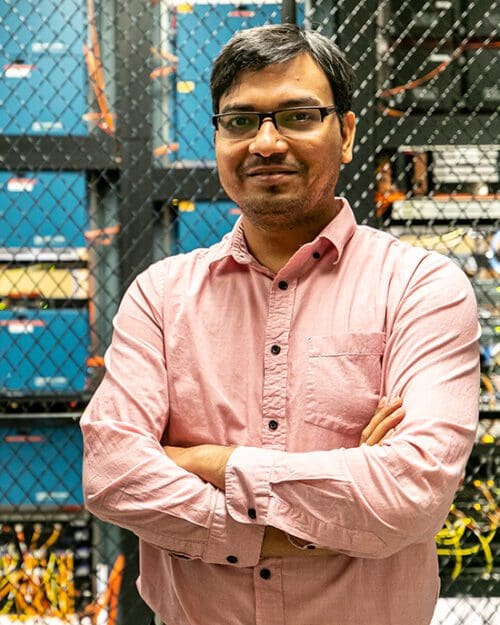Lionhearted Leaders: Quamar Niyaz

Quamar Niyaz, assistant professor of Computer Engineering in the College of Engineering and Sciences, is excited to teach in what he feels is a fast-growing and crucial area of tech education: cybersecurity.
He says that growth has exponentially increased as a result of hybrid learning and working shifts during the COVID-19 pandemic.
“As a technology user, you can receive unsolicited emails with dangerous links,” Niyaz says. “In web browsing, you can find websites on a search engine and click links without knowing if they’re safe or not. On your phones, you can interact with apps that may contain malware. These things push me to educate users about that. When you start a project, you have to think security from the beginning.”
At PNW, Niyaz teaches courses in big data, computer networks, network security, programming, and software engineering.
Service In Education
Niyaz credits his past instructors and advisors for inspiring his teaching and advocacy style.
While working as a research assistant at Indian Institute of Technology, Delhi (India) after his bachelor’s at Aligarh Muslim University in India, Niyaz worked with Dr. Aaditeshwar Seth on providing Internet accessibility to surrounding underprivileged Indian communities.
“I was excited to see the impact of the Internet and developing a low-cost solution to provide connectivity for them,” Niyaz says. “That shaped my idea of research and helping communities through my skills.”
Later, his PhD advisor at the University of Toledo, Dr. Weiqing Sun, introduced him with the interesting and challenging field of cybersecurity.
Niyaz extends that service to the Northwest Indiana community. He worked with Professor Xiaoli Yang to secure two National Science Foundation grants for cybersecurity education and outreach at PNW.
One of those grants has helped PNW students develop cybersecurity education modules for high school students to give them a sense of how vulnerable their data can be on their smartphones.
“I can tease them and show what data they have that’s been collected,” Niyaz says. “They are very surprised these things can happen. They see that and learn to be more careful with it.”
Finding Their Footing
Trying to mirror his own experience while in his own undergraduate and master’s programs, Niyaz wants to provide a welcoming environment for his students.
“I want an environment where students do not feel hesitation or shyness to speak about their doubts,” Niyaz says. “If you have some doubt, raise your concern. I will try my best to explain your queries. If not, I can take that question and come to you later with an answer.”
His undergraduate classes often involve teamwork development with groups. Some of his graduate instruction has almost 35-40% weightage on team projects.
“At the graduate level, I want to bring them into a real-world practice. Your supervisor/mentor will not always sit there with you and help you. He will give you a task, he may give you pointers, but he will expect intellectual independence. I can provide guidance like a shepherd, but it’s your project and you have to carry it on.”
Niyaz says that exploration is key to unlocking independent discovery.
“Then with these projects they can teach me something I don’t know. Most of the time I will teach you, but I also expect you should show me something too. I see surprising results!”